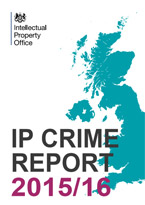 Intellectual Property Office
Intellectual Property Office
Sinopse: It is with great pleasure, as Chair of the IP Crime Group, to deliver an IP Crime Report which presents a broad and fascinating view of the diverse work and progress achieved tackling IP Crime over the last year. The UK is recognised as a global leader, a position reinforced this year by the US Chamber of Commerce stating the UK is now the highest ranked country for IP enforcement. We should be encouraged but of course never complacent as it has been estimated by the EU IPO and OECD3 that in the European Union (EU) counterfeit products amount to up to 5% of all EU imports, worth up to €85 billion.
This year the Government published a new IP Enforcement Strategy to 2020, outlined by the IP Minster Baroness NevilleRolfe, which will focus on continuing the effective partnership work with domestic and international partners from industry, law enforcement and governments in order to tackle the extensive and evolving challenges presented by IP infringement and counterfeiting. The referendum result to leave the EU after 40 years of membership, will no doubt bring significant changes and may influence future collaboration and cooperation with our trading and enforcement partners on IP enforcement.
Other changes include that to design law in the 2014 IP Act, which have made it simpler and more robust to apply legislation, for what is one of the fastest growing sectors within the creative industries, along with a new criminal offence covering the intentional infringement of registered designs.
Pressure from online infringement continues, with illegal downloading presenting a threat to the stability of markets for digital content. PIPCU is becoming recognised as a world leader, having taken down 11,000 websites selling counterfeit goods and initiatives such as Operation Creative being taken up by other countries. The volume is staggering, with recent cooperation between companies and agencies across industry sectors leading to the submission of 100 million URLS to Google and Bing for removal of links to infringing content, and the rise of pirated digital content using set top boxes and Internet Protocol (IPTV) being significant. This proliferation has led to potential changes considered in the Digital Economy Bill 2016, that the existing maximum sentences for online copyright infringement be raised from two to ten years in line with physical copyright infringement.
I am, as ever, very grateful for the contribution made by Trading Standards to the IPO’s IP Crime survey, presented in Chapter 4, as it provides a significant part of the complete picture on IP Crime and underpins the vital role they perform in seeking to protect consumers and tackle significant contributors to the problem like Fulfilment Houses. I urge any reader to review Chapter 3 of the report as it describes many outstanding case studies, often in collaboration between the IPO, industry and law enforcement where individuals and organised crime have been disrupted or prosecuted for the production, movement and sale of infringing goods and digital content into and across the UK.
Finally, I welcome the formation this year of the Illicit Trade National Policing Portfolio led by Commander Greany (National Coordinator for Economic Crime). This will enable increased collaboration across a broad range of sectors like tobacco, alcohol, medicines and health care products, which can fall outside the scope of IP Crime but also fuel the shadow economy, undermine legitimate business and harm communities.
The success of UK IP enforcement speaks for itself, and I commend the diverse members of the IP Crime Group for their commitment in tackling the threat of IP Crime to UK economic growth and stability, bringing innovation, expertise and sustained capability.
